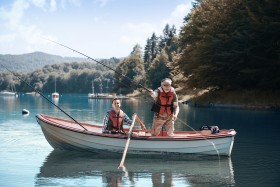Staying Safe on Your Fishing Boat

If you love fishing, Michigan is an excellent place to be. Between the great lakes and the many other lakes found throughout the state, there are many great places to cast your fishing line, whether you prefer to fish from a shoreline, by wading into the water, or by heading out on your boat. But if you prefer to be fishing on a boat, it’s very important to keep in mind that there are some extra safety precautions to take. Here are some things you can do to make sure your next boating trip is a safe one.
Wear a Life Jacket
Wearing a life jacket is one of the easiest and most effective ways to stay safe on your fishing boat. Even if you’re a strong swimmer, it can be easy to unintentionally end up in the water, such as while reeling in a fish or when a turn is being made. The simple fact of the matter is that 84.5% of people who drown in recreational boating accidents were not wearing a life jacket.
Before you head out, make sure you have a life jacket for yourself and for any other passengers who will be joining you on your fishing trip in case they don’t have a jacket of their own. Also, try to make sure they are appropriately sized. Not only will people be likely to take off a life jacket if it’s uncomfortable, life jackets that don’t fit correctly won’t protect users as well as they should. This is particularly important if you’ll be out on your boat with children. Since children grow quickly, a life vest that fit them last summer might be too small for them this year.
It’s also a good idea to routinely check life jackets and any other safety gear to make sure it’s still in good condition. If these types of things get damaged, there’s a chance it could fail right when it’s needed most.
Don’t Get Hooked
Injuries involving fish hooks are one of the most common types of fishing-related injuries. Fishing hook injuries can happen in many different ways, including while trying to unhook a fish, stepping on a fishing hook, or while casting off. Since people might be standing close together on a boat, it’s particularly important to be very careful while casting off so that your hook doesn’t accidentally catch on someone else standing nearby. Check to make sure nobody is standing behind you and that there is at least one rod’s length between yourself and anyone else on the boat with you.
Since there are so many ways people can get caught by fishing hooks, make sure hooks are securely stored when not in use. Don’t set fishing hooks on the floor where people can step on them. And if someone does get caught by a fish hook, make sure the removed hook is placed in a safe place. In some cases, fishers who get caught by fish hooks end up getting caught a second time when the removed hook gets set aside in a place where it was easy to get hooked again.
Clear Trip Hazards
If you’re fishing on a boat large enough to get up and move around, keep an eye out for things that could pose a trip hazard. For example, if someone were to trip over something like a tackle box or a fishing rod that has been set down for a little while, there’s a chance they could end up in the water or injured in another way.
Don’t Fish Alone
Ideally, it’s best to have someone with you when you head out on your fishing boat. That way, someone will be available to help out if you end up in an emergency situation of some kind. Whether you fish alone or with others, make sure you prepare a float plan to let someone know where you’re planning to be, who’s with you, and what time you expect to be back.
Don’t Drink and Boat
Even though many people may love the idea of relaxing by having some beer while they fish, remember that according to the U.S. Coast Guard, alcohol use was the leading known contributing factor of fatal boating accidents, being cited in 19% of boating fatalities in 2018 when the primary accident cause was known.
Follow General Boating Safety Measures
Regardless of why you’re heading out on the water, be sure to follow all general basic boating safety measures. Make sure you’re aware of boating laws that apply, watch your speed, and always check the weather forecast before you head out. Make sure you’re aware of your boat’s recommended guidelines for things like how many people you have on board. Don’t forget to bring an emergency kit with you equipped with things like flashlights, batteries, a marine radio, and maps of the area.
When proper safety precautions aren’t taken, it’s very easy for a fun day on the water to end in tragedy. Even if you follow all the appropriate safety measures, another boat’s negligence can cause accidents that result in serious injuries or death. If you’ve been injured in a boating accident, don’t hesitate to get in touch with a boating accident lawyer. Boating accident cases can be complicated, so you need someone on your side who knows the law and can fight to protect your best interests. At Goodwin & Scieszka, you’ll be able to get help from a lawyer with experience helping Michigan boating accident victims like you. Contact us today to find out how we can help you.






